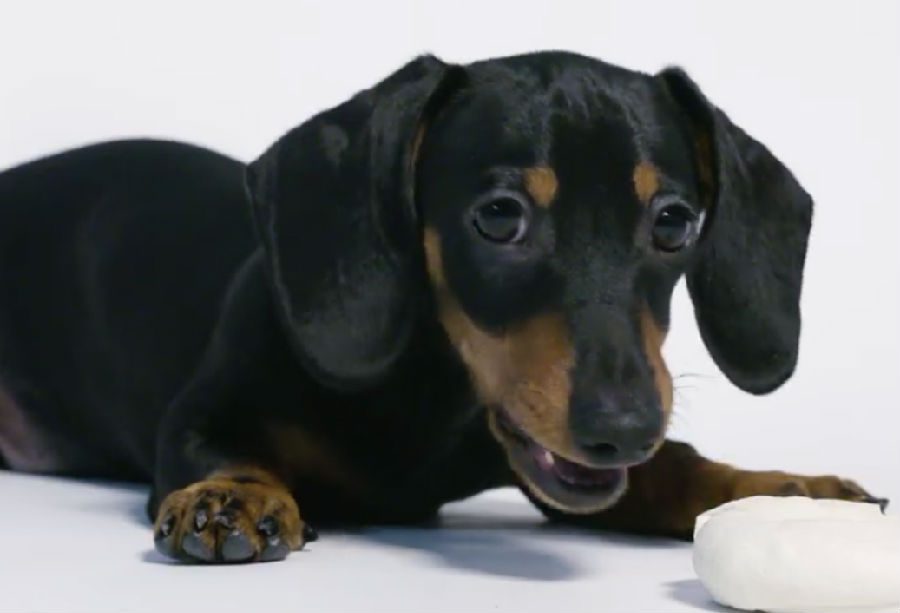(单词翻译:单击)
At New York's American Museum of Natural History,
在纽约的美国自然历史博物馆
we are past the Roosevelt Atrium, through the Frick Building,
我们走进有着罗斯福塑像的中庭,穿过弗里克大厦
and tucked away behind drawers of bones,
和一排排收藏骨头标本的立柜
Doctor Jack Tseng is hard at work.
就来到Jack Tseng博士刻苦钻研的地方
He's a dog guy.
他研究的是狗
Well, I have worked on dog evolution and dog fossil for about 10 years.
嗯,我研究狗的进化以及狗化石差不多有10年了
Jack's the man when it comes to dog evolution,
Jack就是那个谈到狗的进化时
and he says dogs might have a shot at outliving us all.
就会说狗的生存能力可能比人要强的人
Humans have been evolving for roughly 3 million years,
人类进化的历程差不多有300万年了
but dogs have been around way longer.
而狗进化的时间要比人类长得多
And that history goes all the way back 40 million years.
这一时间可以一直追溯到4000万年前
It hasn't been easy.
狗进化的历程并不容易
They've dealt with warming, cooling, the Ice Age.
他们出寒入暖,还经历了冰河世纪
To determine how dogs are going to fare as the world changes,
要弄清随着世界变化时狗的命运
you have to start in the past, because dogs are evolutionary marvels.
我们就不得不从头说起,因为狗是进化史上的一个奇迹
The first dogs weren't really dogs as we know them today.
世界上出现的第一批狗并不是我们现在所谓的狗的样子
They were tree-dwellers and really small.
那时它们还栖息在树上,体型也非常小
They changed to survive.
它们逐渐发生了变化,以便适应生存
They're legs lengthened so they could run longer distances and they grew a lot.
它们的腿变得更长了,从而能够长时间奔跑了,它们的体型也变得庞大得多了
During the Ice Age, the big wolves weighed around 140 pounds.
冰河世纪期间,体型较大的狼体重能够达到140磅左右
But it's their teeth that are really the key to their survival.
然而,真正关系到它们的生存的是它们的牙齿
Their teeth were getting stronger to deal with a larger bones
为了对付更大的骨头,它们的牙齿也变得更加有力了
and the grit that they make in their mouth when they're hunting.
追捕猎物时,它们的咬力也增加了
What he's saying is that it's biological that dogs are eating machines.
博士的意思是,狗是天生的猎食机器
Think of their teeth as a basic blueprint that goes back 40 million years
它们的牙齿不仅可以被视为4000万年前的活化石
and can be adapted to any kind of environmental change.
还能够适应各种环境变化
The teeth in the back crush bone,
位于口腔后部的牙齿负责咬碎骨头
those teeth in the middle are for cutting, and the front teeth are for puncturing.
中间部分的牙齿负责撕碎猎物,而前面部分的牙齿则负责刺入猎物的肉里
What's more, dogs teeth have reinforced surfaces.
此外,狗牙齿的齿面也非常坚固
That means their teeth will stay in tact whether they're eating large bones
这就意味着在食用较大的骨头
or chewing up carcasses.
或是咀嚼尸体时,它们的牙齿能够很好的啮合
It also means dogs don't really need us.
同时也意味着它们其实并不怎么需要我们人类
They'll be able to survive even if we're no longer around to feed them,
即使我们不在它们周围给他们喂食,它们照样能活下去
because they can eat pretty much anything that comes their way.
因为它们差不多是碰到什么就吃什么
If we do go and they're alive,
即便是我们不在了,它们还活着
I'm sure they will adapt to whatever environment that comes their way.
我也敢肯定,它们绝对能适应它们面临的任何环境


